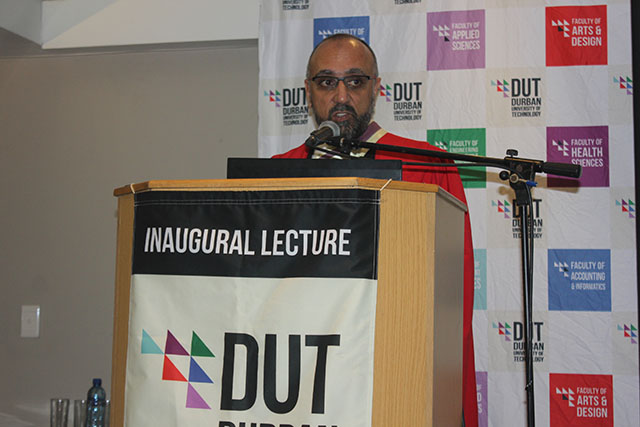In his inaugural lecture last night (Wednesday, 25 March 2015), DUT’s Director of the Institute for Water and Wastewater Technology, Professor Faizal Bux, emphasised the importance of preserving water.
The inaugural lecture was held at the University’s Hotel School Conference Centre, Ritson Campus, during the evening.
An inaugural lecture is a prestigious event which symbolises a milestone in an academic’s career where one progresses to full professorship. It is also an opportunity for the professor to discuss his or her current and future research projects. With one of the University’s goals being to increase the number of academics with PhDs, the inaugural lectures are as much an achievement for the institution as they are for the professor.
Prof Bux has been instrumental in establishing the research niche area of Wastewater Technology. He was actively involved in co-ordinating activities of Microbial Ecology and Water Engineering (MEWE). He is a fellow of the Water Institute of Southern Africa.
Titled “Bugs” for a better environment, Prof Bux’s inaugural lecture largely focused on microorganisms, re-iterated the value of water and the impact of pollution on water and elucidated the role of microbes in wastewater treatment. The inaugural lecture also focused on waste being a problem if not treated adequately leading to pollution and environmental contamination as well as how it (waste) can be used as a resource with positive economic spin-offs and the creation of new industry.
Microorganisms are central to sustaining healthy ecosystems. They (Microorganisms) are very diverse and include all bacteria and archaea and almost all protozoa.
Outlining the importance of Microorganisms, Prof Bux said micros contributed hugely in the treatment of solid waste. He further elaborated that they (micros) are essential for biogeochemical cycles such as carbon, nitrogen, etc. “These little micros are key role players in the ecosystem and in the treatment of waste in treatment plants,” he said.
Prof Bux said in eThekwini, 35.5% of water is lost as non-revenue. Non-revenue water refers to leaks in the water distribution system. Other contributing factors include an ailing infrastructure (26%) and theft/non-payment (9,5%), which all translates to R600 million per annum in lost water.
“We will soon run out of water if we don’t save it. We need to sensitise ourselves and stop deliberate wasting of water, “he said.
With Durban facing a shortage in this resource, Prof Bux said there was a need for an integrated approach where government, water utilities and end-users think of ways to preserve water. “In order to save water, we need behavioural changes. Water re-use is imperative. Government and water stakeholders need to consider ground water. We need more boreholes,” he said.
– Noxolo Memela
Pictured: Professor Faizal Bux, DUT’s Director of the Institute for Water and Wastewater Technology, during his inaugural lecture last night (Wednesday, 25 March 2015).


